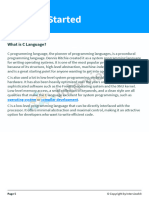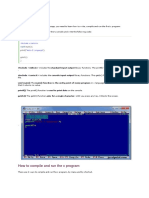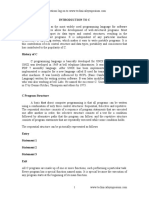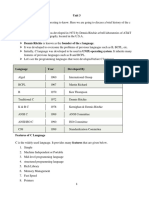C Programming Study Material
Uploaded by
majhis145C Programming Study Material
Uploaded by
majhis1451
C Programming
Unit – I: Introduction to C
History of C Language
History of C language is interesting to know. Here we are going to discuss a brief
history of the c language.
C programming language was developed in 1972 by Dennis Ritchie at bell laboratories of
AT&T (American Telephone & Telegraph), located in the U.S.A.
Dennis Ritchie is known as the founder of the c language.
It was developed to overcome the problems of previous languages such as B, BCPL, etc.
Initially, C language was developed to be used in UNIX operating system. It inherits many
features of previous languages such as B and BCPL.
Features of C Language
C is the widely used language. It provides many features that are given below:
1. Simple
2. Machine Independent or Portable
3. Mid-level programming language
4. structured programming language
5. Rich Library
Computer Age | Sandip Majhi
2
6. Memory Management
7. Fast Speed
8. Pointers
9. Recursion
10. Extensible
To write the first c program, open the C console and write the following code:
#include <stdio.h>
int main(){
printf("Hello Students!!");
return 0;
}
#include <stdio.h> includes the standard input output library functions. The printf() function is
defined in stdio.h .
int main() The main() function is the entry point of every program in c language.
printf() The printf() function is used to print data on the console.
return 0 The return 0 statement, returns execution status to the OS. The 0 value is used for
successful execution and 1 for unsuccessful execution.
Unit – II: Variables & Datatypes in C
Variables in C
A variable is a name of the memory location. It is used to store data. Its value can be
changed, and it can be reused many times. It is a way to represent memory location
through symbol so that it can be easily identified.
The example of declaring the variable is given below:
int a;
float b;
char c;
Rules for defining variables
o A variable can have alphabets, digits, and underscore.
o A variable name can start with the alphabet, and underscore only. It can't start with a
digit.
Computer Age | Sandip Majhi
3
o No whitespace is allowed within the variable name.
o A variable name must not be any reserved word or keyword, e.g. int, float, etc.
Types of Variables in C
There are many types of variables in c:
1. local variable
2. global variable
3. static variable
4. automatic variable
5. external variable
There are the following data types in C language.
Types Data Types
Basic Data Type int, char, float, double
Derived Data Type array, pointer, structure, union
Enumeration Data Type enum
Void Data Type void
Unit – III: Operators, keywords, Identifiers, Format Specifiers, Constants & Static
C Operators
An operator is simply a symbol that is used to perform operations. There can be many types
of operations like arithmetic, logical, bitwise, etc. | Dynamic Method Dispatch
There are following types of operators to perform different types of operations in C
language.
o Arithmetic Operators
o Relational Operators
o Logical Operators
o Bitwise Operators
o Ternary or Conditional Operators
o Assignment Operator
Computer Age | Sandip Majhi
4
Static keyword can be used in the following
situations:
1. Static global variable
When a global variable is declared with a static keyword, then it is known as a static
global variable. It is declared at the top of the program, and its visibility is throughout
the program.
2. Static function
When a function is declared with a static keyword known as a static function. Its
lifetime is throughout the program.
3. Static local variable
When a local variable is declared with a static keyword, then it is known as a static
local variable. The memory of a static local variable is valid throughout the program,
but the scope of visibility of a variable is the same as the automatic local variables.
However, when the function modifies the static local variable during the first function
call, then this modified value will be available for the next function call also.
4. Static member variables
When the member variables are declared with a static keyword in a class, then it is
known as static member variables. They can be accessed by all the instances of a
class, not with a specific instance.
5. Static method
The member function of a class declared with a static keyword is known as a static
method. It is accessible by all the instances of a class, not with a specific instance.
Unit – IV: C control statements ( if-else, switch case, looping statements, break, continue,
goto, label )
Flowchart of the if-else statement in C
Computer Age | Sandip Majhi
5
1. #include<stdio.h>
2. int main(){
3. int number=0;
4. printf("Enter a number:");
5. scanf("%d",&number);
6. if(number%2==0){
7. printf("%d is even number",number);
8. }
9. return 0;
10. }
Output
Enter a number:4
4 is even number
enter a number:5
Program to find the largest number of the three.
1. #include <stdio.h>
2. int main()
3. {
4. int a, b, c;
5. printf("Enter three numbers?");
6. scanf("%d %d %d",&a,&b,&c);
7. if(a>b && a>c)
8. {
9. printf("%d is largest",a);
10. }
11. if(b>a && b > c)
12. {
13. printf("%d is largest",b);
14. }
15. if(c>a && c>b)
16. {
17. printf("%d is largest",c);
18. }
19. if(a == b && a == c)
20. {
Computer Age | Sandip Majhi
6
21. printf("All are equal");
22. }
23. }
Output
Enter three numbers?
12 23 34
34 is largest
Program to calculate the grade of the student
according to the specified marks.
1. #include <stdio.h>
2. int main()
3. {
4. int marks;
5. printf("Enter your marks?");
6. scanf("%d",&marks);
7. if(marks > 85 && marks <= 100)
8. {
9. printf("Congrats ! you scored grade A ...");
10. }
11. else if (marks > 60 && marks <= 85)
12. {
13. printf("You scored grade B + ...");
14. }
15. else if (marks > 40 && marks <= 60)
16. {
17. printf("You scored grade B ...");
18. }
19. else if (marks > 30 && marks <= 40)
20. {
21. printf("You scored grade C ...");
22. }
23. else
24. {
25. printf("Sorry you are fail ...");
26. }
27. }
Computer Age | Sandip Majhi
7
Output
Enter your marks?10
Sorry you are fail ...
Enter your marks?40
You scored grade C ...
Enter your marks?90
Congrats ! you scored grade A ...
C Switch Statement
The switch statement in C is an alternate to if-else-if ladder statement which allows
us to execute multiple operations for the different possibles values of a single
variable called switch variable. Here, We can define various statements in the
multiple cases for the different values of a single variable.
The syntax of switch statement in c language is given below:
1. switch(expression){
2. case value1:
3. //code to be executed;
4. break; //optional
5. case value2:
6. //code to be executed;
7. break; //optional
8. ......
9.
10. default:
11. code to be executed if all cases are not matched;
12. }
Syntax of while loop in C language
The syntax of while loop in c language is given below:
1. while(condition){
2. //code to be executed
3. }
Let's see the simple program of while loop that prints 1 to 10.
Computer Age | Sandip Majhi
8
1. #include<stdio.h>
2. int main(){
3. int i=1;
4. while(i<=10){
5. printf("%d \n",i);
6. i++;
7. }
8. return 0;
9. }
Syntax of for loop in C
The syntax of for loop in c language is given below:
1. for(Expression 1; Expression 2; Expression 3){
2. //code to be executed
3. }
Flowchart of for loop in C
Let's see the simple program of for loop that prints 1 to 10.
1. #include<stdio.h>
2. int main(){
3. int i=0;
Computer Age | Sandip Majhi
9
4. for(i=1;i<=10;i++){
5. printf("%d \n",i);
6. }
7. return 0;
8. }
C Program: Print table for the given number using C
for loop
1. #include<stdio.h>
2. int main(){
3. int i=1,number=0;
4. printf("Enter a number: ");
5. scanf("%d",&number);
6. for(i=1;i<=10;i++){
7. printf("%d \n",(number*i));
8. }
9. return 0;
10. }
do while loop syntax
The syntax of the C language do-while loop is given below:
1. do{
2. //code to be executed
3. }while(condition);
Computer Age | Sandip Majhi
10
Flowchart of do while loop
There is given the simple program of c language do while loop where we are printing
the 1 to 10.
1. #include<stdio.h>
2. int main(){
3. int i=1;
4. do{
5. printf("%d \n",i);
6. i++;
7. }while(i<=10);
8. return 0;
9. }
goto example
Let's see a simple example to use goto statement in C language.
1. #include <stdio.h>
2. int main()
3. {
4. int num,i=1;
5. printf("Enter the number whose table you want to print?");
6. scanf("%d",&num);
7. table:
8. printf("%d x %d = %d\n",num,i,num*i);
Computer Age | Sandip Majhi
11
9. i++;
10. if(i<=10)
11. goto table;
12. }
Unit – V: C Functions, call by value & call by reference, Recursion
C Functions
In c, we can divide a large program into the basic building blocks known as function.
The function contains the set of programming statements enclosed by {}. A function
can be called multiple times to provide reusability and modularity to the C program.
In other words, we can say that the collection of functions creates a program. The
function is also known as procedureor subroutinein other programming languages.
Advantage of functions in C
There are the following advantages of C functions.
By using functions, we can avoid rewriting same logic/code again and again in a
program.
We can call C functions any number of times in a program and from any place in a
program.
We can track a large C program easily when it is divided into multiple functions.
Reusability is the main achievement of C functions.
However, Function calling is always a overhead in a C program.
Function Aspects
There are three aspects of a C function.
Function declaration A function must be declared globally in a c program to tell the
compiler about the function name, function parameters, and return type.
Function call Function can be called from anywhere in the program. The parameter
list must not differ in function calling and function declaration. We must pass the
same number of functions as it is declared in the function declaration.
Function definition It contains the actual statements which are to be executed. It is
the most important aspect to which the control comes when the function is called.
Here, we must notice that only one value can be returned from the function.
Computer Age | Sandip Majhi
12
Types of Functions
There are two types of functions in C programming:
Library Functions: are the functions which are declared in the C header files such as
scanf(), printf(), gets(), puts(), ceil(), floor() etc.
User-defined functions: are the functions which are created by the C programmer,
so that he/she can use it many times. It reduces the complexity of a big program and
optimizes the code.
Different aspects of function calling
A function may or may not accept any argument. It may or may not return any value.
Based on these facts, There are four different aspects of function calls.
function without arguments and without return value
function without arguments and with return value
function with arguments and without return value
function with arguments and with return value
Unit – VI: C Arrays
C Array
An array is defined as the collection of similar type of data items stored at
contiguous memory locations. Arrays are the derived data type in C programming
language which can store the primitive type of data such as int, char, double, float,
etc. It also has the capability to store the collection of derived data types, such as
pointers, structure, etc. The array is the simplest data structure where each data
element can be randomly accessed by using its index number.
Properties of Array
The array contains the following properties.
Each element of an array is of same data type and carries the same size, i.e., int = 4
bytes.
Elements of the array are stored at contiguous memory locations where the first
element is stored at the smallest memory location.
Computer Age | Sandip Majhi
13
Elements of
the array can be
randomly
accessed
since we can
calculate the
address of
each
element of
the array with
the given base address and the size of the data element.
Advantage of C Array
1) Code Optimization: Less code to the access the data.
2) Ease of traversing: By using the for loop, we can retrieve the elements of an array easily.
3) Ease of sorting: To sort the elements of the array, we need a few lines of code only.
4) Random Access: We can access any element randomly using the array.
Disadvantage of C Array
1) Fixed Size: Whatever size, we define at the time of declaration of the array, we can't
exceed the limit. So, it doesn't grow the size dynamically like LinkedList which we will
learn later.
Declaration of C Array
We can declare an array in the c language in the following way.
data_type array_name[array_size];
Now, let us see the example to declare the array.
int marks[5];
// C Program to illustrate the array declaration
#include <stdio.h>
int main()
Computer Age | Sandip Majhi
14
// declaring array of integers
int arr_int[5];
// declaring array of characters
char arr_char[5];
return 0;
}
// C Program to demonstrate array initialization
#include <stdio.h>
int main()
{
int arr[5] = { 10, 20, 30, 40, 50 };
int arr1[] = { 1, 2, 3, 4, 5 };
// array initialization using for loop
float arr2[5];
for (int i = 0; i < 5; i++) {
arr2[i] = (float)i * 2.1;
}
return 0;
}
Types of Array in C
There are two types of arrays based on the number of dimensions it has. They are as follows:
1. One Dimensional Arrays (1D Array)
2. Multidimensional Arrays
Unit – VII: C Strings
C Strings
The string can be defined as the one-dimensional array of characters terminated by a null ('\
0'). The character array or the string is used to manipulate text such as word or sentences.
Each character in the array occupies one byte of memory, and the last character must always
be 0. The termination character ('\0') is important in a string since it is the only way to
Computer Age | Sandip Majhi
15
identify where the string ends. When we define a string as char s[10], the character s[10] is
implicitly initialized with the null in the memory.
322.5K
There are two ways to declare a string in c language.
1. By char array
2. By string literal
String Example in C
Let's see a simple example where a string is declared and being printed. The '%s' is
used as a format specifier for the string in c language.
1. #include<stdio.h>
2. #include <string.h>
3. int main(){
4. char ch[11]={'C', 'o', 'm', 'p', 'u', 't', 'e', 'r','\0'};
5. char ch2[11]="Computer";
6.
7. printf("Char Array Value is: %s\n", ch);
8. printf("String Literal Value is: %s\n", ch2);
9. return 0;
10. }
Gets() and puts()
Let's see an example to read a string using gets() and print it on the console using
puts().
1. #include<stdio.h>
2. #include <string.h>
3. int main(){
4. char name[50];
5. printf("Enter your name: ");
6. gets(name); //reads string from user
7. printf("Your name is: ");
8. puts(name); //displays string
9. return 0;
Computer Age | Sandip Majhi
16
10. }
C String Functions
No. Function Description
1) strlen(string_name) returns the length of string name.
2) strcpy(destination, source) copies the contents of source string to destination string.
3) strcat(first_string, concats or joins first string with second string. The result of the
second_string) string is stored in first string.
4) strcmp(first_string, compares the first string with second string. If both strings are
second_string) same, it returns 0.
5) strrev(string) returns reverse string.
6) strlwr(string) returns string characters in lowercase.
7) strupr(string) returns string characters in uppercase.
There are many important string functions defined in "string.h" library.
Computer Age | Sandip Majhi
You might also like
- C Program Internal-1 Question and Answer (2)No ratings yetC Program Internal-1 Question and Answer (2)19 pages
- C Programming Tutorial by Ramesh DodamaniNo ratings yetC Programming Tutorial by Ramesh Dodamani27 pages
- First C Program: How To Compile and Run The C ProgramNo ratings yetFirst C Program: How To Compile and Run The C Program56 pages
- WINSEM2024-25_BCSE102P_LO_VL2024250504129_2024-12-13_Reference-Material-INo ratings yetWINSEM2024-25_BCSE102P_LO_VL2024250504129_2024-12-13_Reference-Material-I68 pages
- C Programing: Applications of C ProgrammingNo ratings yetC Programing: Applications of C Programming13 pages
- VTU exam Question Paper with Solution of BPOPS103_203 Principles of Programming using C Jan-2024-Rajeshwari RNo ratings yetVTU exam Question Paper with Solution of BPOPS103_203 Principles of Programming using C Jan-2024-Rajeshwari R31 pages
- Chile: Postcode Postcode Type and PositionNo ratings yetChile: Postcode Postcode Type and Position2 pages
- Employee Payment Management System: Submitted ToNo ratings yetEmployee Payment Management System: Submitted To24 pages
- SAP - Logistic Execution SAP - Logistic Ex PDFNo ratings yetSAP - Logistic Execution SAP - Logistic Ex PDF10 pages
- 701-100 Exam - Free Actual Q&As, Page 1 - ExamTopicsNo ratings yet701-100 Exam - Free Actual Q&As, Page 1 - ExamTopics2 pages
- STA 101 Module 1 System Integration and Architecture100% (1)STA 101 Module 1 System Integration and Architecture10 pages
- Software Quality Engineering: Iram HinaNo ratings yetSoftware Quality Engineering: Iram Hina25 pages
- Software Requirements Specification For Android Based Patient Appointment System Group Name: NURUL SHAMSI Prepared byNo ratings yetSoftware Requirements Specification For Android Based Patient Appointment System Group Name: NURUL SHAMSI Prepared by26 pages
- SoftServe Cheat Sheet by Softserve - Download Free From Cheatography - CheatographyNo ratings yetSoftServe Cheat Sheet by Softserve - Download Free From Cheatography - Cheatography2 pages
- First C Program: How To Compile and Run The C ProgramFirst C Program: How To Compile and Run The C Program
- WINSEM2024-25_BCSE102P_LO_VL2024250504129_2024-12-13_Reference-Material-IWINSEM2024-25_BCSE102P_LO_VL2024250504129_2024-12-13_Reference-Material-I
- VTU exam Question Paper with Solution of BPOPS103_203 Principles of Programming using C Jan-2024-Rajeshwari RVTU exam Question Paper with Solution of BPOPS103_203 Principles of Programming using C Jan-2024-Rajeshwari R
- "C Programming for Beginners: A Step-by-Step Guide"From Everand"C Programming for Beginners: A Step-by-Step Guide"
- 701-100 Exam - Free Actual Q&As, Page 1 - ExamTopics701-100 Exam - Free Actual Q&As, Page 1 - ExamTopics
- STA 101 Module 1 System Integration and ArchitectureSTA 101 Module 1 System Integration and Architecture
- Software Requirements Specification For Android Based Patient Appointment System Group Name: NURUL SHAMSI Prepared bySoftware Requirements Specification For Android Based Patient Appointment System Group Name: NURUL SHAMSI Prepared by
- SoftServe Cheat Sheet by Softserve - Download Free From Cheatography - CheatographySoftServe Cheat Sheet by Softserve - Download Free From Cheatography - Cheatography

























































































